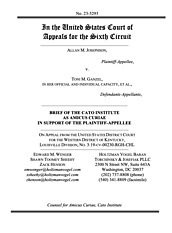Learn more about Cato’s Amicus Briefs Program.
Dr. Allan Josephson is a leading child psychiatrist and academic who was hired to lead the University of Louisville’s Division of Child and Adolescent Psychiatry in 2003. After learning that Dr. Josephson had spoken publicly about his concerns regarding the treatment of gender dysphoria, University officials initiated a campaign to marginalize and ultimately terminate Dr. Josephson in 2019.
Dr. Josephson sued various University officials, alleging that he was fired in retaliation for exercising his right to free speech. The defendants asserted qualified immunity, arguing that while there is a general right not to be fired in retaliation for protected speech, that right was not “clearly established” in the specific factual circumstances of this case.
The district court denied qualified immunity and the defendants appealed to the Sixth Circuit, renewing their argument that Dr. Josephson’s right not to be terminated in retaliation for the specific speech at issue in this case was not sufficiently well established under Sixth Circuit precedent.
Cato’s amicus brief in support of Dr. Josephson explains that qualified immunity is a judicially confected legal doctrine that lower courts should apply narrowly given its complete lack of textual support and the growing chorus of condemnation it has drawn from scholars, public policy organizations across the ideological spectrum, and even members of the judiciary. Cato’s brief also argues that granting qualified immunity when there are significant factual disagreements between the parties also offends the Seventh Amendment’s guaranty of a jury trial in civil cases.

